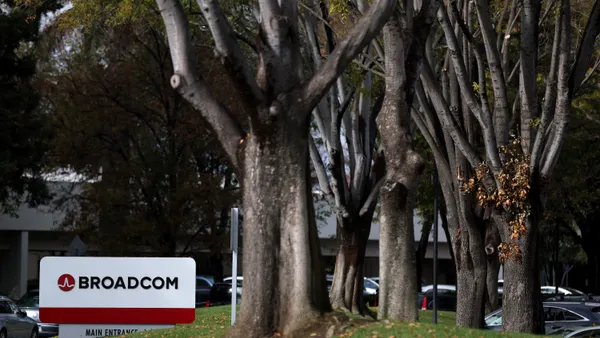Dive Brief:
- Citrix Systems, a software provider specializing in virtualization, is set to go private in an all-cash $16.5 billion acquisition deal, the company announced Monday.
- Acquirers Vista Equity Partners and Evergreen Coast Capital Corporation plan to merge Citrix with software firm TIBCO, a Vista portfolio company specializing in enterprise data management. Shareholders will receive $104 cash per share, a 24% premium over closing price on Dec. 20, when the first reports of a possible acquisition ran.
- The merger, a sign of ongoing consolidation among pure-play software providers, will result in a combined base of 400,000 customers and 100 million users in 100 countries, according to the company. Its customer base will include 98% of the Fortune 500.
Dive Insight:
The Citrix deal exemplifies consolidation in the IT market, as pure-play companies become an attractive target for mergers and acquisitions.
The enterprise IT space features a few recent examples of moves toward a private company structure. In December, cloud-based security software provider Mimecast agreed to go private in a $5.8 billion cash deal with private equity firm Permira. Prior to that, enterprise data management firm Cloudera also went private in June, after agreeing to a $5.3-billion acquisition deal to a group of buyout firms.
In this case, the acquiring parties likely expect an integration between Citrix and TIBCO to have a multiplying effect on their value, according to Brian Jackson, research director in the CIO Practice at Info-Tech Research Group.
"They can take on debt and leverage that to build out a business that is growing its recurring revenue base," said Jackson in an email. "After the firms are well integrated and can attract a higher valuation, there could be an opportunity to return to public markets."
The Citrix deal signals a market move toward consolidation, with attention shifting away from pure-play players in the market, said Tony Harvey, senior research director at Gartner. "The interesting thing that we'll have to wait to see what happens is how they integrate [Citrix] with the data analytics from TIBCO."
There's a potential upside in taking a company off the public market, said Harvey.
"The advantage to going private is that it allows you to do some of the more complex restructuring that does have an impact on the top and bottom line without then having to answer to Wall Street and share price issues," said Harvey.
The acquisition of Citrix comes shortly after a leadership transition, with CEO David Henshall stepping down in October. In a November earnings call, interim CEO Bob Calderoni referred to an ongoing restructuring process "focused on growth."
In taking Citrix private, acquirers could be looking to a playbook laid out by Dell Technologies nearly 10 years ago, Jackson said. The company went private in a $25 billion deal in 2013, a response to sliding PC sales and the need for a new strategy. Two years later, the company began a new chapter in its trajectory with the $67 billion acquisition of EMC in 2015.
"This rejuvenated its brand in the enterprise and provided new opportunities to find efficiency at scale," said Jackson. "After integrating Dell and EMC, Dell Technologies returned to public markets in 2018 to raise money to pay down its debt."















